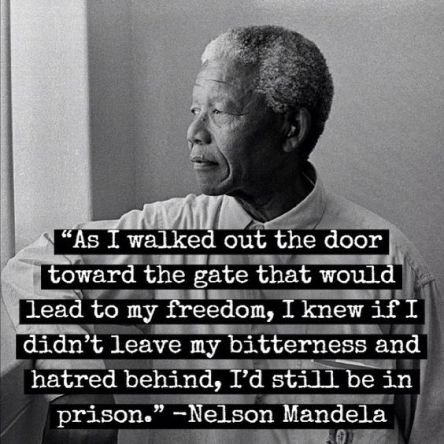Having spent the last three weeks in South Africa, it is impossible not to think of Nelson Mandela and of the impact of his leadership on his country. Mandela spent 27 years exiled and imprisoned for his political views, and then emerged to lead his country out of the darkness of apartheid. He was elected President and instead of punishing those who had imprisoned him, his message was one of forgiveness and of bringing all the South African people together. He changed the course of his country forever, and brought it back onto the world scene after many years of exclusion.
I long for leaders like this in America…a President and a Congress who would work hard to bring us together rather than continue to divide us. Leaders who are able to see this as the way to the best America, and who are also strong enough to press through our current culture of divisiveness to inspire us with and achieve this vision. It would be difficult, admittedly. American voters keep rejecting leaders who seem inclined to this approach, choosing instead representatives who promise to maintain the fight, no matter what. We are electing leaders who disdain and even desire to punish those who disagree with them. Why do we believe this is what we should do?
It seems to be our human nature to choose sides like this and fight for our beliefs. And the disagreement is important – it is how the best solutions are reached. But at some point, we have to come together in compromise to achieve good things for our country. Instead, we seem to value a refusal to compromise. What does this do for us, though? Staying divided keeps us from being able to move forward. We can get stuck in a perpetual stalemate. And think of how much time and energy and money is wasted on maintaining the divide.
How can this atmosphere bode well for our country? Anger and bitterness is not the answer. Surely in unity is our strength! Remember the old adage “united we stand, divided we fall.” This truth was acknowledged by Jesus in the Bible (Matthew 12:25), as well as by many of our Founding Fathers.
I am reluctant to be another critical voice among the many around us today. But I sincerely long to hold on to the hope of a different vision of America by sharing it. I know others share this vision of unity, rather than division. We who do must begin to speak up, rather than be silenced by the louder voices promoting division. I believe the future of our country depends on it.
Believing in the power of unity,
Catherine





 I am excited to begin writing about and sharing with you what He has been pouring into me for over 30 years now. I do this out of love for God and in gratitude for His gift of grace…
I am excited to begin writing about and sharing with you what He has been pouring into me for over 30 years now. I do this out of love for God and in gratitude for His gift of grace…